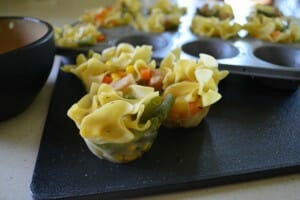So What Vegetables Can You Freeze?
When it comes to freezing food, we’re as guilty as anyone of not taking advantage of the time-stopping powers of vacuum sealing and icy air. Sure, we’ll cut a big piece of ground beef into more manageable pieces and freeze it for a few months, but we often fail to get creative with fruits and vegetables. As much as most of us would love the idea of a summer-fresh smoothie in the dead of winter, we’re either too busy or too intimidated by the freezing process. After all, what vegetables can you freeze? Is there anything that doesn’t make the cut? Are their tricks to ensuring our corn on the cob stays vibrant yellow and crunchy instead of limp, sad, and a little strange? We’ve vowed to stop making excuses; this summer, we’re actually going to freeze fresh produce from our garden (or even the neighborhood supermarket) so that our winter days can be full of soups made from fresh squash, smoothies made from July strawberries, and more! Keep reading to learn what vegetables and fruits you can freeze, and which ones to avoid.
What fruits and vegetables can you freeze?
You can freeze pretty much all fruit (berries, bananas, pineapple, peaches, etc.), but whether you want to or not depends on what you’re planning on doing with it. Want a stash of ripe July cherries on hand for smoothies throughout the year? Picked up a mango for some special salsa but realized you’d like to wait a little bit before making it? Freeze away! All you have to do is wash the fruit properly, dry, and divide into easy portions, either by cutting in big chunks or using a food processor for smaller pieces. Use a vacuum sealer and seal it up tight, and store for up to a year. However, if you’re thinking about freezing some fruit, thawing it, and eating it raw, you might want to reconsider. Fruit that’s been frozen and thawed tends to have a strange texture and look a little odd.
So what vegetables can you freeze? Like fruit, pretty much every veggie can live a long and happy life in your freezer; we love freezing late summer sweet corn and then thawing it in the middle of January, or freezing tomatoes for delicious November soups. The real trick to freezing anything? Blanching! Blanching means dropping vegetables in a pot of boiling hot water for two to five minutes, and then immediately dunking it into ice water, and then drying. If you blanch vegetables at their peak ripeness, they’ll stay colorful and flavorful for months in the freezer.
But what about foods you can’t freeze?
As much as we’d love to freeze every item of produce in our crisper drawer, some fruits and veggies just won’t cut it in the freezer. For example, raw foods with lots of moisture like cucumbers or oranges don’t really freeze well, especially if you’re planning on eating them raw again. All the water and moisture inside the produce freezes, and when it thaws, tends to look a little off. With few exceptions (for example, if you want to freeze tomatoes from the garden to make into a soup later on, go for it!), try to avoid putting anything particularly water-heavy in the freezer.
Same goes for especially creamy foods. When delicious yogurt or your favorite cheese hits the freezer, the curds separate from the whey. This tends to result in a frightening-looking defrosted dairy product that will taste okay but have a very non-yogurt texture. This can be fine if you’re looking to use dairy products in a recipe, or you’re freezing an entire dish that includes creamy ingredients. Experiment with what works for you!
As a basic rule, try to avoid freezing the following fruits and vegetables on their own if you have the intention of defrosting them and eating them raw; nothing on this list will kill you if you do want to individually freeze them, but their texture and appearance will be a little funny!
Vegetables: Raw potatoes, green peppers, onions, lettuce, cucumbers, celery, radishes
Fruits: Lemons, limes, oranges, watermelon, apples, grapefruit, grapes
Dairy: Cheese, cottage cheese, custard, eggs in shells, yogurt, sour cream, mayonnaise, cream cheese




Comments (3)
Linda Robinson
Learned a lot , Thank you
Barbara Collins
I freeze Green, Yellow, and Red Peppers. They are great in soups and eggs and much more.. Just be sure they are dry and place them loosely in a plastic bag until frozen..
Eloise D. Martin
Wow thanks I really learned a thing or too about what fruits and veggies can be froze and which can’t.